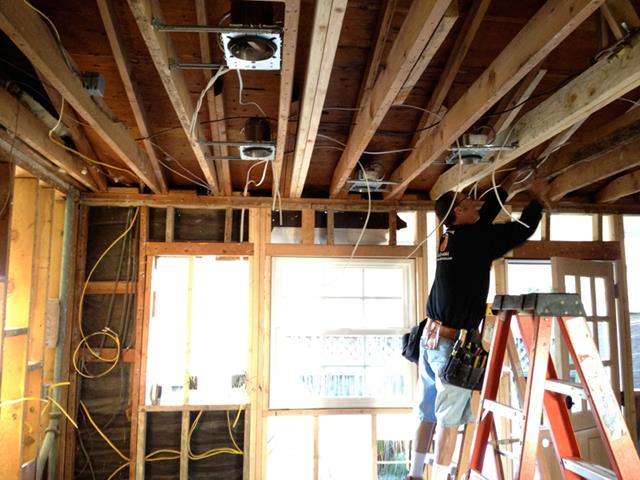Five reasons why upgrading the electrics is worthwhile and possible necessary when renovating a property such as fitting the latest consumer unit (fuse box) types.
Ensuring your property is safe and capable of handling electrical demands
You clearly need your house electrical system to be safe and up to the task of supplying power effectively, so it makes sense to consider upgrading your electrics when conducting a renovation. This is an ideal chance to update your electrical wiring and related equipment while likely disruption is taking place.
Out of sight out of mind
A lot of your electrical system isn’t noticed on a daily basis since most of it isn’t on view; wiring is mostly hidden in wall cavities or buried in the plaster, and often the consumer unit (fuse box) may be located in a seldom visited cupboard or alcove. Therefore, upgrading electrics may not be a high priority unlike, say, redecorating deteriorating paintwork or fixing a leaking tap.
There are, however, good reasons to upgrade your electrics, but it’s definitely not for the DIY enthusiast; seek the services of our experienced and qualified Colchester Electricians.
Some reasons to upgrade your electrics:
- Outdated consumer unit
If your electrics haven’t been updated in some years, if ever, then unless you’re living in a relatively new build property your consumer unit – commonly known as the fuse box – probably requires full or partial replacement.
Later types feature an invaluable safety feature, the RCD (Residual Current Device). They’re attached to each circuit and will, in a matter of milliseconds, activate and cut the power if they detect a problem such as an appliance in use that could cause a fire or shock, or if someone touches a live wire.
Along with the RCD, modern consumer units dispense with the old wire fuses in favour of modern designs, and since January 2016 metal clad consumer units are required in all new electrical installations to add extra protection in the event of a fire breaking out in the unit itself.
- Changing requirements
More electrical items are used nowadays than older wiring would have been designed to cater for; extra lighting, electrical equipment and more rooms needing power such as home offices and extensions could mean your electrics are struggling to meet your needs.
- New build or alterations
If your renovation includes an extra area such as an extension or even the ‘opening out’ of rooms and spaces not previously used, then you’d be likely having some new electrics installed, and these must conform to Building Regulations BS 7671. It makes sense then to ensure the rest of your electrics at least have a ‘clean bill of health’ or maybe an upgrade commensurate with the new installations.
- Your electrics aren’t coping
If you notice signs your electrics aren’t coping with your demands, or may have a fault somewhere, then an upgrade could be called for.
Take heed of the following:
- Circuit breakers tripping regularly
- Noticeable flickering or dimming of lighting on occasion
- Slight shocks or noticeable sparking or small flashes when plugging or unplugging items
- Any damaged cabling
- Ad hoc previous electrical installations
It may be apparent that extra circuits or other wiring has been added on since the main electrical system was installed. If you notice some mains sockets of a different style or design to others, or wiring running down a wall instead of being concealed, then chances are extra electrics have been added over time.
These may be perfectly safe and efficient, but it’s a good opportunity to standardise your overall electrical system. At the very least have them checked over.
How to tell what electrical work may be required
Opinions can vary as regards how often wiring may or may not need replacing; some say about ten years, others may double or triple this or say not to worry at all if the electrical system is working effectively.
Therefore, the best course of action is to ask a reputable electrician to undertake an inspection and determine what work may be required and the likely costs.





